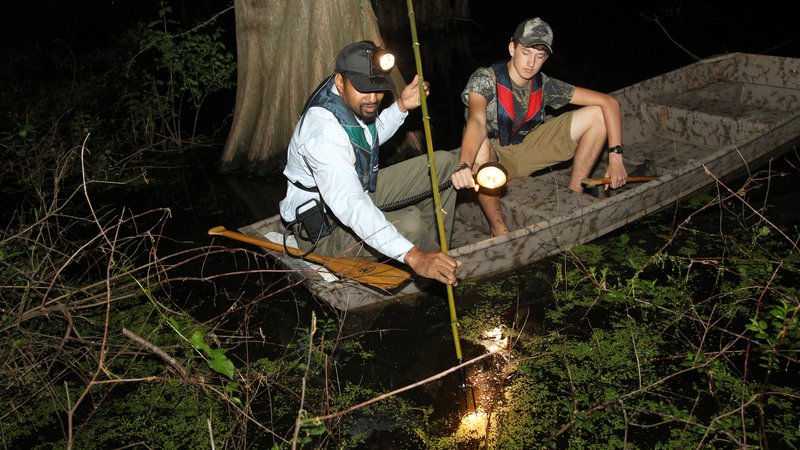Frog hunting usually requires one person to keep a steady light on the quarry and the other to do the gigging.
Randy Zellers Assistant Chief of Communications
Regular bouts of rain may have kept many gardens on hold during the last few weeks, but they’ve filled most backwaters and ponds just in time for folks who get excited about opening night of frog gigging.
Arkansas’s frog hunting season runs from noon April 15 until midnight Dec. 31 each year. In Arkansas, only bullfrogs may be harvested, and the limit is 18 frogs per day, measured from noon one day until noon the next day.
There are relatively few rules for frog hunting, but you do need a fishing license to be legal. Guns are not allowed to harvest frogs, but most people opt for long multitined spears called gigs to capture their frogs. Nets and arrows also may be used, or if you’re stealthy enough and have a sure grip you may want to give grabbing the frogs bare-handed a shot.
No matter which method you use, frogging requires you to get as close as possible to your target, which means your best bet is to go at night.
Frogging is often a two-person hunt. One will navigate a small flat-bottomed boat or canoe while the other is designated as the grabber or gigger. The boat captain will scan the shoreline with a spotlight watching for the frog’s bright yellow glowing eyes to shine back and give up its location. From there the pair will ease into striking range of the frog while keeping the light on it, which bewilders the quarry long enough to take a shot at gigging it.
Be sure to scan the bushes along the banks before making an approach on any frog. Plenty of spiders set up shop along the shore’s edge to catch their prey, and the webs can be a pain. Snakes also climb into low-hanging branches of brush along the water’s edge. Many tales of men walking on the water during a frog-gigging trip begin with a snake falling into the boat. While most water snakes are not venomous, it doesn’t make it any less frightening when one plops in the boat next to you.
Some froggers work with bows and arrows, usually the bowfishing type with the arrows connected by fishing line to a reel on the bow. A good bow shooter can take frogs from a greater distance than a gigger can, but the target is small, and the lighting can be tricky.
Frogs in Arkansas are plentiful, but finding them is a major part of the game. Oxbows in the Delta are typically the best locations for a frog hunt, but a few lily pad-rich lakes and backwaters also offer plenty of bullfrogs for a good hunt. As with most other types of hunting, scouting good locations and putting in some “leg work” is key to a successful outing.
Cleaning the frogs after a night of gigging is relatively simple. Cut it in half just above the waist, then peel down the skin from the legs with a pair of pliers. Snip off the bottom feet and the legs are ready to be grilled or rolled in your favorite breading and fried.






